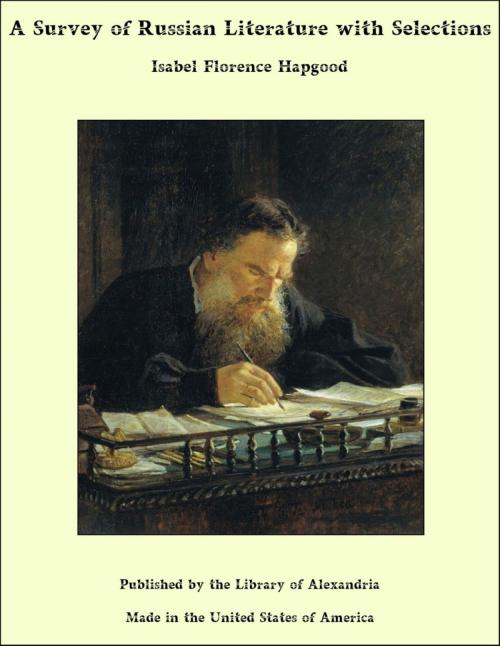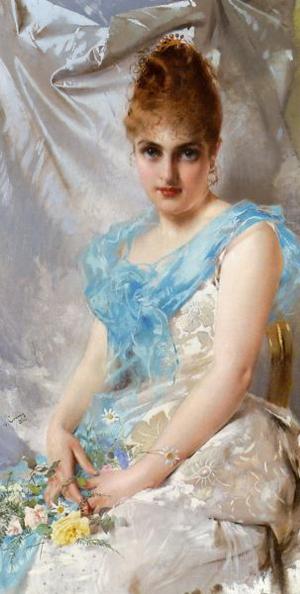A Survey of Russian Literature with Selections
Nonfiction, Religion & Spirituality, New Age, History, Fiction & Literature| Author: | Isabel Florence Hapgood | ISBN: | 9781465601933 |
| Publisher: | Library of Alexandria | Publication: | March 8, 2015 |
| Imprint: | Language: | English |
| Author: | Isabel Florence Hapgood |
| ISBN: | 9781465601933 |
| Publisher: | Library of Alexandria |
| Publication: | March 8, 2015 |
| Imprint: | |
| Language: | English |
Whether Russia had any literature, or even a distinctive alphabet, previous to the end of the tenth century, is not known. In the year 988, Vladímir, Grand Prince of Kíeff, accepted Christianity for himself and his nation, from Byzantium, and baptized Russia wholesale. Hence his characteristic title in history, "Prince-Saint-equal-to-the-Apostles." His grandmother, Olga, had already been converted to the Greek Church late in life, and had established churches and priests in Kíeff, it is said. Prince Vladímir could have been baptized at home, but he preferred to make the Greek form of Christianity his state religion in a more decided manner; to adopt the gospel of peace to an accompaniment of martial deeds. Accordingly he compelled the Emperors of Byzantium, by force, to send the Patriarch of Constantinople to baptize him, and their sister to become his wife. He then ordered his subjects to present themselves forthwith for baptism. Finding that their idols did not punish Vladímir for destroying them, and that even great Perún the Thunderer did not resent being flung into the Dniépr, the people quietly and promptly obeyed. As their old religion had no temples for them to cling to, and nothing approaching a priestly class (except the volkhvýe, or wizards) to encourage them in opposition, the nation became Christian in a day, to all appearances. We shall see, however, that in many cases, as in other lands converted from heathendom, the old gods were merely baptized with new names, in company with their worshipers. Together with the religion which he imported from Byzantium, "Prince-Saint" Vladímir naturally imported, also, priests, architects, artists for the holy pictures (ikóni), as well as the traditional style of painting them, ecclesiastical vestments and vessels, and—most precious of all—the Slavonic translation of the holy Scriptures and of the Church Service books. These books, however, were not written in Greek, but in the tongue of a cognate Slavonic race, which was comprehensible to the Russians.
Whether Russia had any literature, or even a distinctive alphabet, previous to the end of the tenth century, is not known. In the year 988, Vladímir, Grand Prince of Kíeff, accepted Christianity for himself and his nation, from Byzantium, and baptized Russia wholesale. Hence his characteristic title in history, "Prince-Saint-equal-to-the-Apostles." His grandmother, Olga, had already been converted to the Greek Church late in life, and had established churches and priests in Kíeff, it is said. Prince Vladímir could have been baptized at home, but he preferred to make the Greek form of Christianity his state religion in a more decided manner; to adopt the gospel of peace to an accompaniment of martial deeds. Accordingly he compelled the Emperors of Byzantium, by force, to send the Patriarch of Constantinople to baptize him, and their sister to become his wife. He then ordered his subjects to present themselves forthwith for baptism. Finding that their idols did not punish Vladímir for destroying them, and that even great Perún the Thunderer did not resent being flung into the Dniépr, the people quietly and promptly obeyed. As their old religion had no temples for them to cling to, and nothing approaching a priestly class (except the volkhvýe, or wizards) to encourage them in opposition, the nation became Christian in a day, to all appearances. We shall see, however, that in many cases, as in other lands converted from heathendom, the old gods were merely baptized with new names, in company with their worshipers. Together with the religion which he imported from Byzantium, "Prince-Saint" Vladímir naturally imported, also, priests, architects, artists for the holy pictures (ikóni), as well as the traditional style of painting them, ecclesiastical vestments and vessels, and—most precious of all—the Slavonic translation of the holy Scriptures and of the Church Service books. These books, however, were not written in Greek, but in the tongue of a cognate Slavonic race, which was comprehensible to the Russians.















